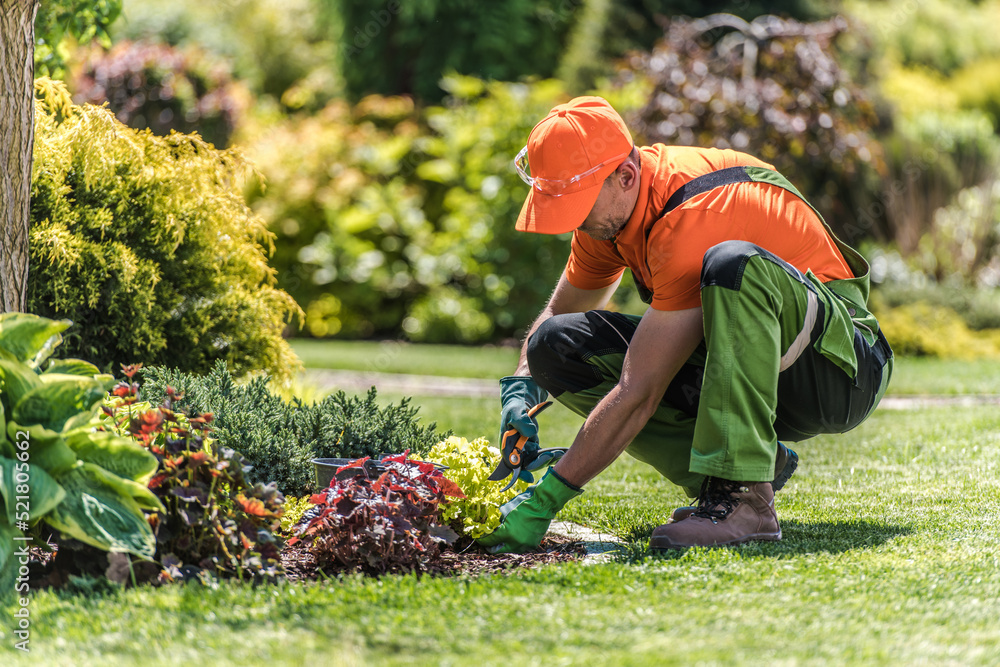Gardeners play a key role in keeping our green spaces looking great and healthy. They do lots of things like taking care of plants and designing beautiful outdoor areas. Their work helps make our surroundings more beautiful and supports the environment.
By looking after plants and landscapes, gardeners help our natural habitats grow. This makes their job very important for our community’s health and well-being.
Understanding the Role of a Gardener
Gardeners do a lot more than just water plants. They design, plan, and maintain gardens. Their work makes sure gardens look good and are good for the environment.
Gardeners mix creativity with practical skills. They pick the right plants and prepare the soil. They design gardens that show off nature’s beauty.
Their work does more than just look good. It helps local ecosystems and improves community health. Skilled gardeners are key to creating spaces that are good for nature and fun for everyone.
Key Responsibilities of a Gardener
Gardeners are key to keeping gardens alive and looking great. They do many tasks to keep plants healthy and the garden balanced. Knowing how to care for plants, prepare soil, and handle pests is crucial. This knowledge helps gardeners make gardens look better and grow more.
Plant Care and Maintenance
Looking after plants is the first step to a beautiful garden. Gardeners water, prune, and check on plants regularly. Knowing what each plant needs is important.
Plants need different amounts of sunlight and water. Gardeners must adjust their care to meet these needs. Checking the soil helps avoid watering too much or too little.
Soil Preparation and Fertilisation
Soil is the base of all plant life. It must be prepared and have the right nutrients. Testing the soil tells gardeners what it needs.
Adding organic compost and fertilisers helps plants grow. This makes the soil better for plants and is good for the environment. Better soil means healthier plants.
Pest and Disease Management
Keeping pests and diseases under control is vital. Spotting problems early helps prevent damage. Using a mix of methods, like natural controls and careful pruning, is best.
Knowing about common diseases helps gardeners keep their gardens healthy. This way, they can enjoy beautiful gardens for a long time.
| Task | Description | Importance |
|---|---|---|
| Watering | Regular supply of moisture tailored to plant needs. | Prevents stress and promotes healthy growth. |
| Pruning | Trimming plants to encourage growth and remove dead material. | Enhances air circulation and plant health. |
| Soil Testing | Assessing soil properties to determine pH and nutrient levels. | Informs fertilisation and composting decisions. |
| Pest Monitoring | Regular check-ups for signs of infestation. | Eases early intervention and control measures. |
Tools and Equipment Used by Gardeners
The journey of gardening starts with the right tools and equipment. Good tools make gardening easier and more efficient. Investing in quality garden equipment helps plants thrive and boosts garden productivity.
Essential Hand Tools
Hand tools are key for daily gardening tasks. Tools like trowels, pruners, and hand forks are vital for plant care. They offer precision and control.
A sturdy trowel makes digging and planting easy. Pruners help make clean cuts, keeping plants healthy. Keeping these tools in good condition ensures they last longer and work better.
Powered Equipment
Powered equipment is a big part of modern gardening. Tools like lawn mowers, hedge trimmers, and blowers make big tasks quicker and easier. When choosing powered equipment, look for durability and ease of use.
| Type of Tool | Function | Recommended Brand |
|---|---|---|
| Trowel | Digging and transplanting | Fiskars |
| Pruners | Trimming and shaping plants | Secateurs |
| Hand Fork | Soil loosening | Wolf-Garten |
| Lawn Mower | Mowing grass | Victa |
| Hedge Trimmer | Maintaining hedges | Makita |
Types of Gardening Specialties
Gardening covers many areas, each meeting different needs and tastes. Residential gardening is a key area, focusing on making home gardens lively and useful. It aims to improve both looks and mental health.
It includes landscape design, ornamental gardening, and edible gardening. These make private gardens a source of pride for homeowners.
Residential Gardening
This area deals with the needs of home garden care. Homeowners want spaces that are welcoming and productive, showing their style. They use native plants, grow veggies, and plant ornamental flowers.
With more people living in cities, many turn their backyards into gardens. This boosts self-sufficiency and supports green living.
Commercial Landscaping
Commercial landscaping is for outdoor spaces in businesses, parks, and public areas. It needs a special skill set. This is because it involves bigger designs and plants that do well in various places.
Community and Public Gardening Projects
Community gardens bring people together and connect them with nature. They focus on being green and improving local areas. In public spaces, greenery makes areas look better and offers learning chances for locals.
Gardener Skills and Qualifications
To be a top gardener, you need to learn the basics. Knowing about plant biology helps you understand what different plants need. This ensures they grow well and stay healthy. Also, knowing design principles is key to making gardens that look great and meet client or community needs.
Doing regular gardening tasks is essential. This includes pruning, watering, and fertilising. These activities keep gardens in top shape. Getting qualifications like the Certificate III in Horticulture helps you learn these important skills.
Learning doesn’t stop after you finish school. Many gardeners keep learning through workshops, seminars, and online courses. Places like TAFE Australia or the University of Melbourne offer these chances. They help gardeners grow professionally and appreciate sustainable gardening more.
Environmentally Sustainable Gardening Practices
Using environmentally sustainable gardening practices is key to keeping ecosystems healthy and reducing harm to the environment. Organic gardening helps us grow our gardens in a way that respects nature. By managing soil and rotating crops, we keep our soil healthy for the long term. This approach also supports biodiversity, creating a balanced garden ecosystem.
Organic Gardening Techniques
Organic gardening focuses on natural materials and methods. It involves enriching soil with compost, controlling pests with natural methods, and rotating crops to use nutrients well. These practices help beneficial organisms in the garden, making plants stronger and reducing the need for harmful chemicals. Natural pesticides, made from plants and animals, are safe for plants and the environment.
Water Conservation Methods
Managing water wisely is a big part of sustainable gardening. Using drip irrigation and mulch helps save water and keeps the soil moist. Swales and rain gardens catch and use rainwater. These methods help protect local water sources and keep plants healthy.
| Gardening Practice | Description | Benefits |
|---|---|---|
| Soil Management | Utilising compost and organic matter to improve soil health | Enhances nutrient availability and supports plant growth |
| Crop Rotation | Changing the type of crops grown in a specific area each season | Reduces pests and diseases, improves soil nutrients |
| Drip Irrigation | Delivering water directly to the plant roots in a controlled manner | Reduces water waste and promotes efficient water usage |
| Mulching | Applying organic materials on the soil surface | Suppresses weeds, enhances soil moisture retention |
Working Conditions for Gardeners
Gardeners in Australia face many challenges due to the country’s varied climate. They must deal with hot summers, cold winters, and unpredictable rain. Knowing how to care for plants in each season is key to their health and growth.
Seasonal Challenges
Every season brings its own gardening hurdles. Summer’s heat means gardeners need to water plants well. Winter’s cold can slow growth, so they must protect plants. Rain can cause soil erosion or rot, while dry spells slow growth.
Adjusting gardening methods for these seasonal issues helps plants thrive and grow well.
Physical Demands of the Job
Gardening in Australia is physically demanding. Tasks like digging and weeding require a lot of energy. Working outside, especially in harsh weather, can be tiring.
To stay energized, gardeners should use ergonomic practices and drink plenty of water. This helps them stay effective and enjoy their work.
| Season | Challenges | Strategies |
|---|---|---|
| Summer | Extreme heat, drought | Mulching, proper irrigation |
| Autumn | Fluctuating temperatures, increased pests | Pest management, planting cold-resistant varieties |
| Winter | Frost, reduced growth | Protective covers, indoor planting |
| Spring | Changing weather, potential flooding | Soil preparation, planning drainage systems |
Gardener: A Vital Role in Our Communities
Gardeners are key to our communities. They boost community spirit and improve environmental health. Their work in urban areas makes places look better and helps locals feel better too.
Gardeners do more than just water plants. They teach people about growing food and caring for plants. This helps community members feel connected and work together.
Community gardens are also homes for many animals and plants. Gardeners help these ecosystems thrive in cities. This makes the air and soil cleaner for everyone.
Gardeners join programs like Community Greening and work with groups like Landcare Australia. They help fix damaged areas. Their hard work shows how important they are for a greener, healthier future.
Conclusion
Gardeners play a key role in our ecosystems and communities. They do more than just care for plants. They improve our surroundings, support wildlife, and boost our health.
Their knowledge in plant care and green practices is crucial. This is especially true as we face more environmental issues.
The need for skilled gardeners will only grow. As cities get bigger and more people want to live sustainably, gardening becomes even more important. Gardeners are vital in introducing new ways to make spaces beautiful and strong.
In short, gardeners do a lot more than just garden. They teach, lead, and protect our green areas. They will keep shaping our environment, making gardening a key part of our future.
Supporting gardeners is essential for a healthier, greener world. Let’s value and support their work as we aim for a better society.


